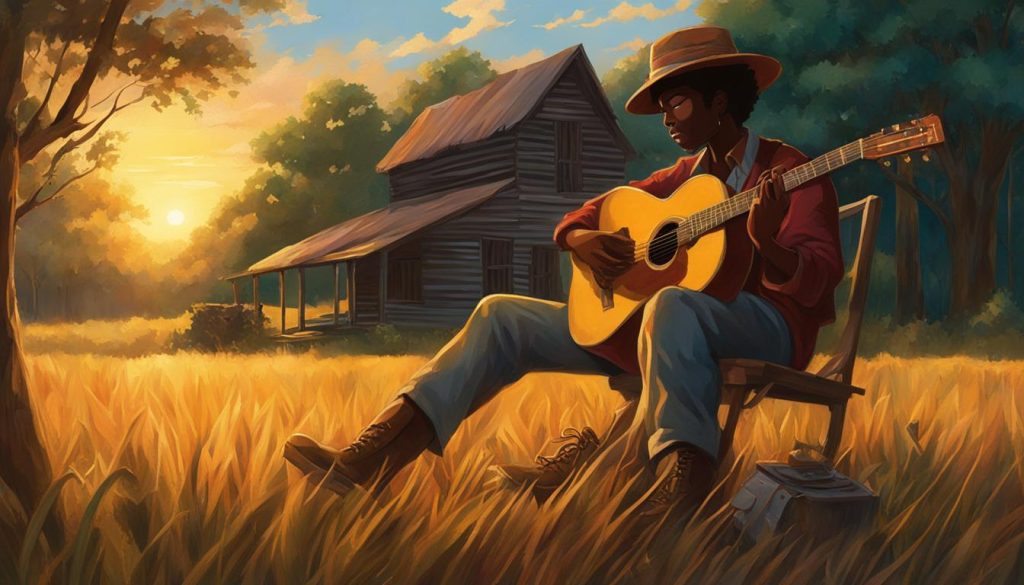Understanding What Are Blues: Music Genre Insights
The blues is a genre of music that originated in the United States in the late 19th century. It has since evolved into an internationally recognized music style with a unique sound and has made a significant impact on the world of music.
Blues music is known for its melancholic lyrics, distinctive chord progressions, and storytelling that reflects the African American experience. Its roots can be traced back to African music traditions and have since evolved through the African American experience, particularly during the era of slavery and segregation. Understanding what blues music truly is and its cultural significance is essential to fully appreciate its impact on the world of music.
Key Takeaways:
- The blues is a music genre with a unique sound and melancholic lyrics.
- The roots of blues music can be traced back to African music traditions.
- Blues music has evolved through the African American experience during the era of slavery and segregation.
- Blues music is an essential part of the African American experience and an internationally recognized style of music.
- Understanding the cultural significance of blues music is crucial to fully appreciate its enduring legacy and influence on other genres.
Exploring the Origins of Blues
Blues music has its roots in African musical traditions that were brought over to America by enslaved Africans. The music evolved through the African American experience, particularly during the era of slavery and segregation.
Influential blues artists such as Robert Johnson, Son House, and Muddy Waters helped shape the genre into what it is today. Their work reflected their personal experiences and struggles, and their music resonated with audiences across different regions in the United States.
“Blues ain’t nothing but a good man feeling bad.” – Willie Brown.
The blues is a tonic for whatever ails you. I could play the blues and then not be blue anymore.
– B.B. King
As blues music spread, it incorporated diverse elements from different regions, including Mississippi Delta, Texas, and Chicago. Blues artists began experimenting with new sounds and styles, eventually leading to the creation of various subgenres within the blues.
Migration and the Spread of Blues

As African Americans migrated from the South to the North and West, the blues followed. The distinctive sounds of artists like Howlin’ Wolf and B.B. King were heard in cities like Detroit and Los Angeles, as well as in Europe.
The origins of blues music are deeply tied to the history of African Americans in America. By understanding the origins of the blues, we gain valuable insight into the experiences and struggles that shaped the music and its enduring legacy today.
Characteristics of Blues Music
Blues music is characterized by its soulful melodies, emotional lyrics, and distinctive instrumental techniques. It is often associated with feelings of melancholy and sadness, but also with hope and resilience in the face of adversity.
One of the defining features of blues music is its use of the twelve-bar blues chord progression, which is comprised of three chords played over twelve bars. This structure provides a framework for blues musicians to improvise and add their own personal touch to the music.
Another key characteristic of blues music is its lyrical content. Many blues songs tell stories of heartbreak, loss, and struggle, often drawing from the experiences of African Americans in the early 20th century. The lyrics are typically delivered in a raw and unpolished style, with an emphasis on emotion and expression over technical precision.
Subgenres of Blues Music
Over the years, blues music has evolved into a variety of subgenres, each with its own unique characteristics and influences. Some of the most notable subgenres include:
- Delta Blues: originating in the Mississippi Delta region, this acoustic style of blues is characterized by its slide guitar techniques, fingerpicking, and powerful vocal delivery.
- Chicago Blues: developed in the urban environments of Chicago, this style of blues is characterized by its use of amplified electric guitars, harmonicas, and a faster tempo than traditional blues music.
- Texas Blues: originating in the Lone Star State, this style of blues is characterized by its use of the shuffle rhythm, boogie-woogie piano, and a gritty, rough-hewn sound.

“The blues tells a story. Every line of the blues has a meaning.”
Overall, the characteristics of blues music make it a unique and powerful genre that continues to influence musicians around the world. Its soulful melodies, emotional lyrics, and emphasis on personal expression have ensured that the blues remain a vital part of the music landscape today.
Conclusion
Understanding what blues music truly is provides a deeper appreciation for its impact on the world of music. The blues genre has a rich history rooted in the African American experience, and its enduring legacy has influenced countless other genres. By exploring its origins, characteristics, and cultural impact, readers can gain a greater understanding of the importance of this musical genre.
As the article has discussed, the blues genre is not just a type of music but a reflection of the African American experience. Its unique elements, including its melancholic lyrics, storytelling, specific musical scales, and chord progressions, create an emotional connection with listeners. Additionally, the diversity of subgenres within the blues demonstrates its versatility and adaptability through time.
In conclusion, understanding what the blues is and its cultural significance can broaden one’s knowledge and appreciation for music as a whole. By studying blues music, scholars and enthusiasts alike can learn more about the African American experience while enjoying the timeless creations of influential artists. The blues genre remains a powerful expression of the human condition, making it an essential cornerstone of music history and culture.
FAQ
What are blues?
Blues is a music genre that originated in African American communities in the United States. It is characterized by its melancholic lyrics, storytelling, and distinctive musical elements.
What is the significance of blues music?
Blues music holds great cultural and historical significance. It emerged as a powerful form of expression for African Americans, reflecting their experiences of oppression, resilience, and hope. Additionally, blues has had a profound influence on various music genres, shaping the course of popular music.
How did blues music originate?
Blues music finds its roots in African musical traditions that were brought to the United States by enslaved individuals. Over time, it evolved through the African American experience, particularly during times of slavery, segregation, and the growth of African American communities.
Who were influential blues artists?
Numerous artists have played pivotal roles in shaping the blues genre. Prominent figures include Robert Johnson, B.B. King, Muddy Waters, Ma Rainey, and Howlin’ Wolf, to name a few. These artists’ contributions have left an indelible mark on the history of blues music.
What are the characteristics of blues music?
Blues music is characterized by its soulful vocals, often accompanied by instruments like the guitar, harmonica, and piano. It features a specific chord progression known as the 12-bar blues and utilizes the blues scale, which incorporates blue notes. The lyrics of blues songs focus on themes like love, loss, hardship, and resilience.
Are there different subgenres within blues music?
Yes, the blues genre encompasses various subgenres, each with its own unique characteristics. Examples include Delta blues, Chicago blues, Texas blues, Piedmont blues, and British blues. These subgenres emerged in different regions and contributed to the rich diversity within blues music.
Why is it important to understand blues music?
Understanding blues music allows us to appreciate its historical and cultural significance. It provides insight into the experiences of African Americans and the struggles they faced. Moreover, blues music serves as a bridge to understanding the evolution of other music genres and the profound impact it has had on the musical landscape.
How has blues influenced other genres of music?
Blues has had a significant influence on numerous music genres, including rock and roll, jazz, soul, and R&B. Elements of blues can be heard in the guitar riffs, vocal styles, and improvisation techniques used in these genres. Its impact continues to be felt in contemporary music as artists pay tribute and incorporate blues elements into their music.
What is the enduring legacy of blues music?
The legacy of blues music extends far beyond its origins. It has become a powerful symbol of resilience, cultural identity, and artistic expression. The influence of blues can be felt in countless songs and performances, reminding us of the lasting impact this genre has had on the world of music.
